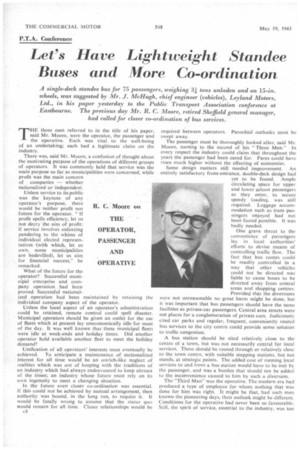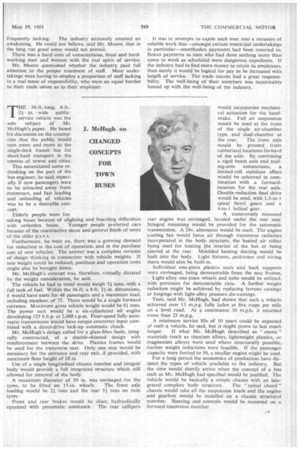Let's Have Lightweight Standee Buses and More Co-ordination
Page 46

Page 47

If you've noticed an error in this article please click here to report it so we can fix it.
A single-deck standee bus for 75 passengers, weighing 31 tons unladen and on 15-in. wheels, was suggested by Mr. J. McHugh, chief engineer (vehicles), Leyland Motors, Ltd., in his paper yesterday to the Public Transport Association conference at Eastbourne. The previous day Mr. R. C. Moore, retired Sheffield general manager,
had called for closer co-ordination of bus services.
THE three men referred to in the title of his paper, said Mr. Moore, were the operator, the passenger and the operative. Each was vital to the well-being of an undertaking; each had a legitimate claim on the industry.
There was, said Mr. Moore, a confusion of thought about the motivating purpose of the operations of different groups of operators. It was commonly held that service was the main purpose so far as municipalities were concerned, while profit was the main concern of companies — whether nationalized or independent.
Unless service to its public was the keynote of any operator's purpose, there would be neither profit nor future for the operator. 'If profit spells efficiency, let us not decry the aim of profit: if service involves enforcing pandering to the whims of individual elected representatives (with which, let us own, some municipalities are bedevilled), let us aim for financial success," he remarked.
What of the future for the operator? Successful municipal enterprise and company operation had been proved. Successful nationalized operation had been maintained by retaining the individual company aspect of the operator.
Unless the local aspect of an operator's administration could be retained, remote control could spell disaster. Municipal operators should be given an outlet for the use of fleets which at present lay uneconomically idle for most of the day. It was well known that these municipal fleets were idle at week-ends and holiday times. Did another operator hold available another fleet to meet the holiday demand?
Unification of all operators' interests must eventually be achieved. To anticipate a maintenance of sectionalized interest for all time would be an ostrich-like neglect of realities which was out of keeping with the traditions of an industry which had always endeavoured to keep abreast of the times; an industry whose future must rely on its own ingenuity to meet a changing situation.
In the future even closer co-ordination was essential. If this could not be achieved by mutual arrangement, then authority was bound, in the long run, to require it. It would be fatally wrong to assume that the status quo would remain for all time. Closer relationships would be
R. C. Moore on THE OPERATOR, PASSENGER AND OPERATIVE
required between operators. Parochial outlooks must be swept away.
The passenger must be thoroughly looked after, said Mr. Moore, turning to the second of his "Three Men." In every respect the industry could claim that throughout the years the passenger had been cared for. Fares could have risen much higher without the effecting of economies.
Some design matters still needed improvement. An entirely satisfactory front-entrance, double-deck design had yet to be found. Ample circulating space for upper and lower saloon passengers as they enter, to secure speedy loading, was still required. Luggage accommodation such as tram passengers enjoyed had not been found possible. It was badly needed.
One grave threat to the convenience of passengers lay in local authorities' efforts to devise means of controlling traffic flow. The fact that bus routes could be readily controlled in a way that other vehicles could not be directed was liable to cause buses to be diverted away from central areas and shopping centres. Provided that the diversions were not unreasonable no great harm might be done, but it was important that bus passengers should have the same facilities as private-cat passengers. Central area streets were not places for a conglomeration of private cars. Judiciously cited car parks and regular, frequent, conveniently routed bus services to the city centre could provide some solution to traffic congestion.
A bus station should be sited relatively close to the centre of a town, but was not necessarily central for local services. These should be routed through or relatively close to the town centre, with suitable stopping stations, but not stands, at strategic points. The added cost of running local services to and from a bus station would have to be met by the passenger, and was a burden that should not be added to the inconvenience caused to him by such a diversion.
The "Third Man" was the operative. The modern era had produced a type of employee for whom nothing that was done for him was right. It might be that, had such men known the pioneering days, their outlook might be different. Conditions for the operative had never been so favourable. Still, the spirit of service, essential to the industry, was too frequently lacking. The industry anxiously awaited an awakening. He could not believe, said Mr. Moore, that M the long run good sense would not prevail.
There was a hard core of conscientious, loyal and hardworking men and women with the real spirit of service.
Mr. Moore questioned whether the industry paid full attention to the proper treatment of staff. Most undertakings were having to employ a proportion of staff lacking in a real sense of responsibility, who were an equal burden to their trade union as to their employer. It was in attempts to cajole such men into a measure of reliable work that—amongst certain municipal undertakings in particular—unorthodox payments had been resorted to. Bonus payments to men who had done nothing more than come to work as scheduled were dangerous expedients. If the industry had to find more money to retain its employees, then surely it would be logical for pay to be increased with length of service. The trade unions had a great responsibility. The well-being of their members was inextricably bound up with the well-being of the industry.




























































































































